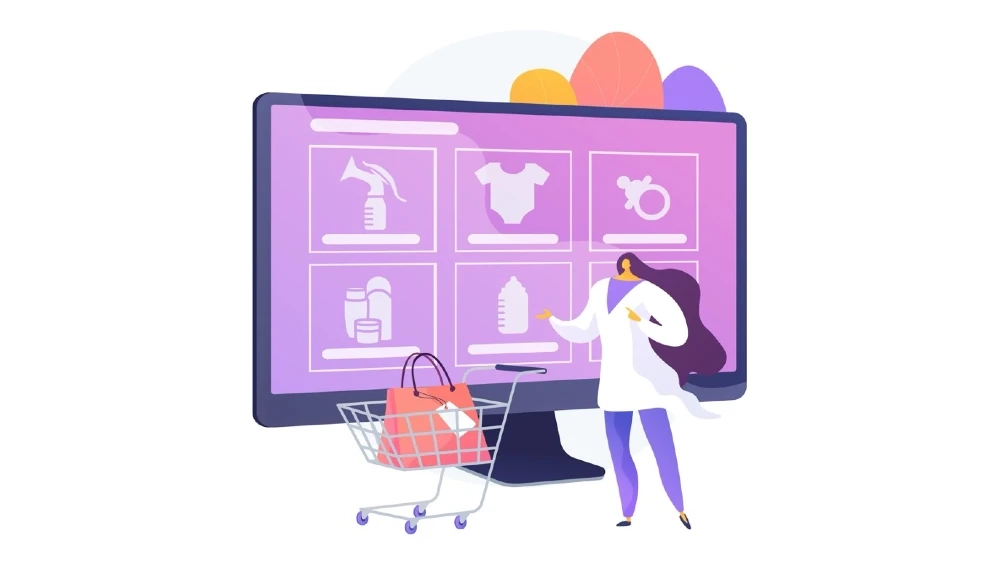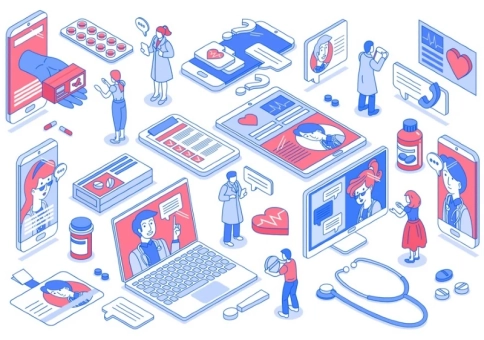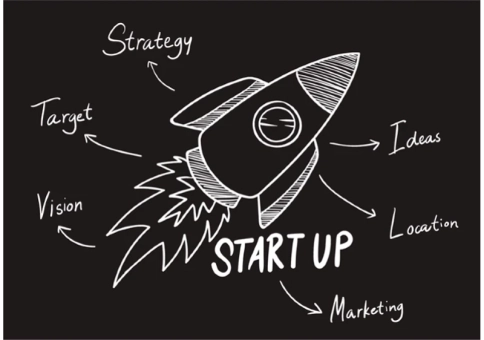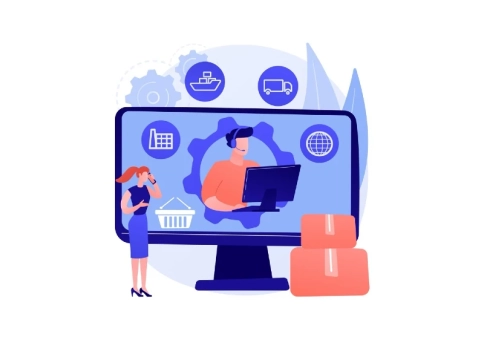Software Development for Retail and Wholesale Trade: All You Need To Know
Retail software development is revolutionizing how businesses operate, providing tools that enhance efficiency and increase profitability. With global retail sales projected to reach $31.1 trillion in 2024, surpassing the $30 trillion mark for the first time, the demand for innovative software solutions is more critical than ever.
This growth emphasizes the importance of technology in retail, allowing businesses to streamline operations, optimize inventory management, and create personalized customer experiences. It is a critical asset for retailers that want to stay afloat in a rapidly evolving market.
image by vectorjuice on Freepik
Types of Retail Software Solutions
Retail businesses have a myriad of software solutions to enhance their operations and customer interactions. These solutions can help manage various aspects of retail operations, from point-of-sale transactions in street retail to inventory control and customer relationship management.
Point of Sale (POS) Systems
Point of Sale (POS) systems are essential for processing sales transactions, managing customer purchases, and tracking sales data. A robust POS system includes features like barcode scanning, receipt printing, and sales reporting. Advanced systems also integrate with inventory management and customer loyalty programs. Examples of well-known POS software in the retail industry include Square POS and Clover POS.
Inventory Management Software
Inventory Management Software helps retailers maintain optimal stock levels, reduce excess inventory, and avoid stockouts. Key features include real-time inventory tracking, automated reordering, and integration with sales data for accurate forecasting. This software ensures that retailers can meet customer demand without overstocking. Prominent inventory management solutions include TradeGecko and Cin7.
Customer Relationship Management (CRM) Systems
Customer Relationship Management (CRM) systems are designed to manage a retailer's interactions with current and potential customers. CRM software helps collect customer data, manage customer interactions, and automate marketing campaigns. Features often include customer segmentation, targeted marketing, and sales tracking. Salesforce and Zoho CRMs are the leading examples of such software.
E-commerce Platforms
E-commerce Platforms enable retailers to sell their products online, reaching a broader audience and offering a convenient shopping experience. These platforms include features like product catalog management, shopping cart functionality, payment processing, and order management. One of the most famous e-commerce platforms is Shopify, which is used by all kinds of retail businesses worldwide.
Supply Chain Management Software
Supply Chain Management Software optimizes the flow of goods from suppliers to customers, ensuring efficient logistics and inventory management. Key features include demand forecasting, supplier management, order processing, and shipment tracking. This software helps retailers reduce costs and improve delivery times. Leading examples include SAP SCM and Oracle SCM Cloud.
image by vectorjuice on Freepik
Mobile Retail Applications: Smart Retail in Your Phone
Mobile retail applications are transforming the retail landscape by offering consumers a seamless and personalized shopping experience directly from their smartphones. Such apps provide unique features such as personalized push notifications, mobile payment options, and augmented reality (AR) for virtual try-ons. According to a report by eMarketer, mobile commerce accounted for 45% of total e-commerce sales in 2023, highlighting the growing importance of mobile retail apps.
One of the standout features of mobile retail apps is their ability to deliver personalized shopping experiences. Shops like Amazon and Target use advanced algorithms in their apps to analyze customer behavior and preferences and provide tailored product recommendations and promotions. Additionally, mobile payment solutions such as Apple Pay and Google Wallet enhance the convenience and security of transactions, contributing to a smoother checkout process.
Augmented reality is another innovative feature that has gained popularity in mobile retail apps. For instance, the IKEA Place app uses AR technology to allow users to visualize how furniture would look in their homes, significantly enhancing the shopping experience. Similarly, the Sephora Virtual Artist app enables customers to try on makeup virtually, making it easier to choose products without visiting a physical store.
Loyalty programs integrated into mobile apps also play a crucial role in enhancing customer engagement and retention. Starbucks' mobile app, for example, not only allows customers to place orders and make payments but also offers a highly successful rewards program that has significantly boosted customer loyalty.
Mobile retail applications are not just about convenience; they are also powerful tools for retailers to engage with customers and drive sales. With the global number of smartphones constantly increasing, their expansion in the retail industry is inevitable.
image by vectorjuice on Freepik
Emerging Technologies in Retail Software
Now, let's pretend we're in a retail magazine for a second and discuss the emerging technologies and trends that are already transforming the retail industry, offering innovative solutions that enhance all aspects of the retail experience.
Artificial Intelligence and Machine Learning
Artificial Intelligence (AI) and Machine Learning (ML) enable smarter decision-making and personalized customer experiences. AI-driven analytics help retailers predict customer preferences, allowing for more effective product recommendations and personalized marketing campaigns. ML algorithms enhance inventory management by predicting demand trends, reducing stockouts, and optimizing supply chains. Additionally, AI-powered chatbots and virtual assistants streamline customer service, providing instant support and improving overall customer satisfaction.
Internet of Things (IoT)
The Internet of Things (IoT) is making significant strides in retail by connecting devices and systems to collect and share real-time data. IoT-enabled sensors and smart shelves track inventory levels and automatically trigger restocking processes, ensuring optimal stock levels and reducing losses due to overstocking or stockouts. In supply chain management, IoT devices monitor the location and condition of goods in transit, providing visibility and reducing delays. IoT also enhances customer interaction through smart fitting rooms and personalized in-store experiences, creating a more engaging and efficient shopping environment.
Augmented Reality (AR) and Virtual Reality (VR)
Augmented Reality (AR) and Virtual Reality (VR) are transforming the retail landscape by offering immersive shopping experiences. AR applications allow customers to visualize products in their own space before purchasing, while VR technology provides virtual try-on experiences, allowing customers to test products like clothing or makeup virtually, and reducing return rates. Additionally, VR can create immersive in-store experiences, such as virtual tours and interactive displays, making shopping more engaging and enjoyable.
Common Challenges in Retail Software Development
Retail software development is a complex process that involves addressing various challenges to create effective and efficient solutions. These challenges can significantly impact the project's development timeline, budget, and overall success, especially if the project doesn't have an experienced intelligent systems developer on board.
Integration with Legacy Systems
One of the primary challenges in retail software development is integrating new software with existing legacy systems. Many retailers operate with outdated technology that lacks compatibility with modern software solutions. This integration is crucial for the seamless flow of information across different platforms. Potential solutions include using middleware to bridge the gap between old and new systems or adopting microservices architecture, which allows for more flexible and scalable integration.
H3: Data Security and Privacy
Ensuring data security and privacy is another significant challenge, especially with the increasing amount of customer data being collected. Retail software must comply with stringent data protection regulations like GDPR and CCPA. To overcome this challenge, developers should implement robust encryption methods, conduct regular security audits, and incorporate advanced authentication mechanisms such as biometric verification or multi-factor authentication to safeguard sensitive information.
Scalability and Performance
Retail businesses often experience fluctuating demand, particularly during peak shopping seasons. Developing software that can scale efficiently to handle increased loads without compromising performance is a major challenge. Utilizing cloud-based infrastructure can provide the necessary scalability, allowing resources to be dynamically allocated based on demand. Additionally, optimizing the codebase and employing performance monitoring tools can help maintain high performance during peak times.
IV. User Experience and Interface Design
Creating an intuitive and engaging user experience is essential for retail software but can be challenging due to diverse user needs and preferences. Developers need to focus on designing user-friendly interfaces that are easy to navigate. Conducting user testing and gathering feedback during the development process can help identify pain points and areas for improvement. Implementing responsive design principles ensures that the software performs well on various devices, enhancing the overall user experience.
Addressing these challenges in retail software development requires innovative approaches and continuous improvement. By focusing on integration, security, scalability, and user experience, developers can create robust solutions that meet the evolving needs of the retail industry.
image by vectorjuice on Freepik
5 Reasons to Opt For Custom Software Development
Every business has unique needs and challenges that off-the-shelf solutions often cannot fully address. Custom software development offers a tailored approach, ensuring that the software aligns perfectly with specific business requirements and goals.
Reason 1: Personalized Fit and Functionality
Custom software development provides a tailored solution that seamlessly fits with your business operations. Unlike generic software, which often requires you to adapt your processes, custom software matches your workflows and addresses your specific challenges. This personalized fit ensures higher efficiency, as the software is built with your unique needs in mind, providing functionalities that off-the-shelf products may lack.
Reason 2: Scalability and Flexibility
Businesses grow and evolve, and so do their software needs. Custom software development offers the flexibility to scale and adapt as your business expands or changes. Unlike pre-packaged solutions, custom software can be easily modified to incorporate new features or accommodate increased workloads. This scalability ensures that the software remains relevant and useful over time, supporting your business’s long-term growth and adaptability.
Reason 3: Enhanced Security
Security is a paramount concern for any business, especially in today’s digital landscape. Custom software development allows for the implementation of advanced security measures tailored to your specific needs. The personalized approach to security can better protect sensitive data and mitigate risks associated with cyber threats. Custom solutions can include unique encryption methods, access controls, and compliance with industry-specific regulations, providing a higher level of security than standard software options.
Reason 4: Competitive Advantage
Investing in custom software development can give your business a significant competitive edge. Custom solutions can streamline operations, improve customer experiences, and support innovative business models that set you apart from competitors. By addressing your specific pain points and leveraging unique functionalities, custom software helps you operate more efficiently and respond more agilely to market changes, thus enhancing your overall competitiveness.
Reason 5: Integration with Existing Systems
One of the major benefits of custom software development is the ability to integrate seamlessly with your existing systems. Off-the-shelf software often requires significant adjustments or may not integrate well with other tools you use. Custom software, on the other hand, is designed to work harmoniously with your current systems, enhancing overall operational efficiency. This integration capability reduces the risk of disruptions and ensures a smooth workflow, making your business processes more cohesive and efficient.
image by vectorjuice on Freepik
Top Retail Solutions With Fetocan
Choosing Fetocan for your software needs ensures that your business benefits from cutting-edge technology and personalized solutions. Our comprehensive suite of agi;e development services is crafted to meet both the unique challenges of the retail industry and your business needs. With Fetocan, you’ll get:
- Tailored software development: Our solutions are custom-built to fit your specific business processes and requirements, ensuring maximum efficiency and effectiveness.
- Robust security: We prioritize your data security with advanced protection measures tailored to your needs, ensuring compliance with industry standards.
- Budget-friendly solutions: We offer flexible pricing models to fit your budget, ensuring you get the best value without compromising on quality.
- Personalized approach: Our team works closely with you to understand your unique needs and tailor solutions that align perfectly with your business goals.
Partnering with Fetocan means investing in a future-proof solution that meets your current needs and supports your long-term growth and success. Experience the difference that expertly designed retail software can make for your business with Fetocan’s top-tier solutions.











